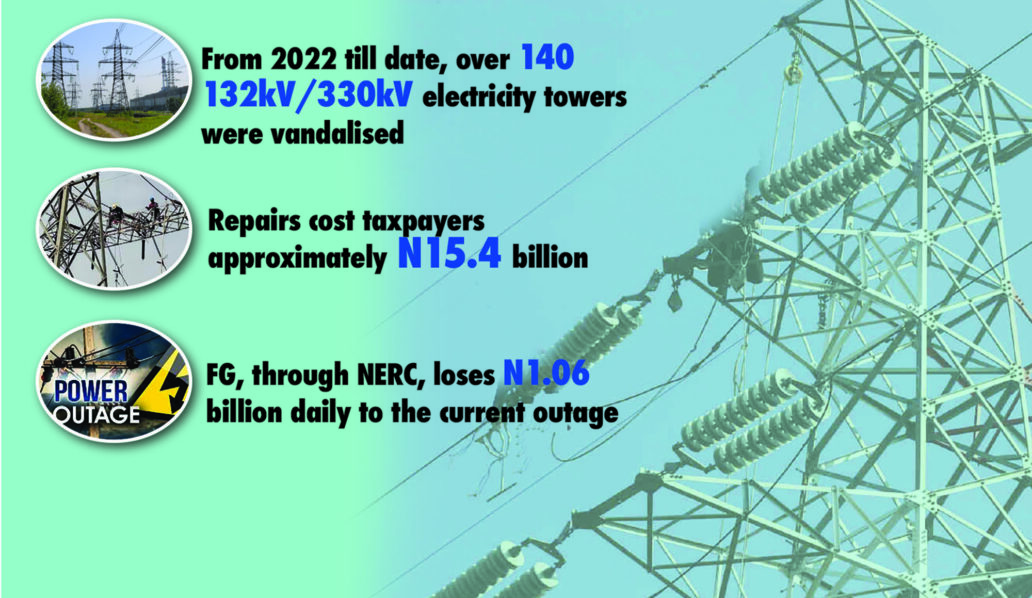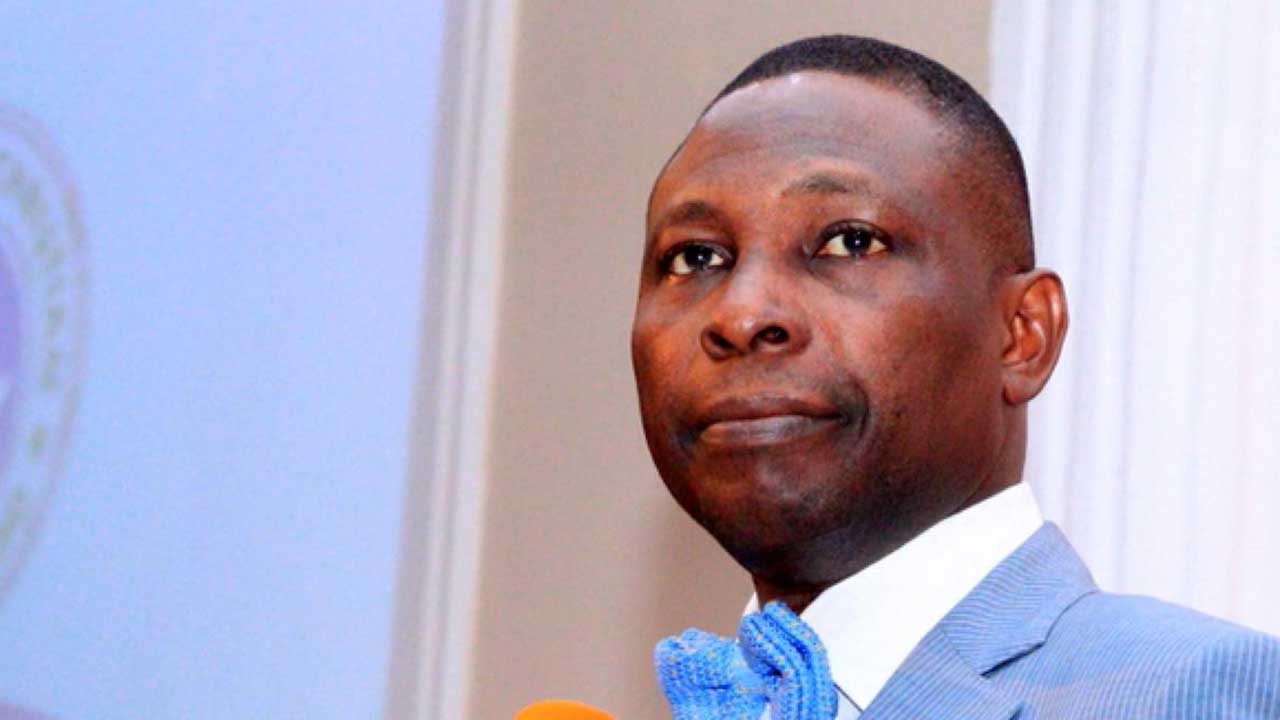 • North facing prolonged darkness despite hosting 3,163MW power plants
• North facing prolonged darkness despite hosting 3,163MW power plants
• TCN struggles with grid restoration as vandals cripple power lines
• Experts call for decentralised power generation to save region’s DisCos
• Power Minister Adelabu summons TCN, NERC leadership to emergency meeting
• Constitutes six-member technical committee to address challenges
The ongoing power generation crisis in northern Nigeria risks straining diplomatic relations and reducing foreign revenue, as it threatens the power supply to neighbouring countries such as Niger, Chad, and Benin, which rely on Nigeria for electricity.
The Guardian learnt that Niger, which is taking power from Nigeria through two corridors has been impacted by the situation. Half of the contracted power meant to be supplied to the country is being met through the Kainji to Birnin-Kebbi and to Niamey, but Katsina transmission line which linked the country has been cut off.
While Chad and Cameroon are looking to take power from Nigeria, the present development will impact the move, worsening foreign exchange earnings for repair of critical infrastructure in the power sector.
The other two countries, Benin Republic and Togo are however not currently impacted but suffer the grid challenges as a result of the challenge.
Despite hosting over 3,000 megawatts of power generation capacity and five electricity distribution companies, the northern region of Nigeria faces the prospect of prolonged darkness, as insecurity and challenges within the Transmission Company of Nigeria (TCN) jeopardise the financial stability of the power sector, leading to factory shutdowns.
This development has drawn criticism from former Vice President Abubakar Atiku, governors and senators from the northern regions, while businesses and homes across nearly all 19 northern states continue to suffer from persistent power outages.
Although the TCN should have a backup plan to supply power to states during emergencies, all the lines connecting the region—including the 330kV Ugwuaji-Apir Double Circuit transmission lines (1 & 2)—have been damaged, and restoration seems elusive.
Between 2022 and October 2024, over 140 132kV/330kV electricity towers were vandalised across the country, particularly in the northern region. This resulted in significant economic losses and N110 million bill to repair each vandalised asset. To restore all 140 towers, approximately N15.4 billion may be required.
While the TCN announced yesterday that efforts are underway to repair the lines, industry stakeholders have argued that the prevailing situation highlights underlying issues within the government agency.
The Guardian learnt that some flour mills in Kano have shut down their plants, sending workers home until power is restored. Meanwhile, the Kaduna, Jos, Kano, and Yola distribution companies (DisCos), which are mandated to remit a certain amount of revenue under the Nigerian Electricity Regulatory Commission (NERC) minimum remittance order, may be losing about N1.06 billion daily.
Given the recurring nature of power outages in the region, the four DisCos, along with the Abuja DisCo, which is also partially affected, could exacerbate the liquidity crisis in the power sector despite the recent increase in electricity tariffs, which are predicated on the consistent power supply.
The ongoing vandalism also challenges the over $7 billion in loans taken by former President Muhammadu Buhari’s administration to upgrade the transmission segment of the electricity sector and deliver a stable supply.
During a third similar attack in September, vandals destroyed Tower 372 along the Gombe-Damaturu-Maiduguri transmission network, plunging Yobe and Maiduguri into darkness. Although the TCN announced restoration in the region after vandals brought down two towers, the situation remains unstable. In May, the Biu-Dambua 132kV transmission line was damaged as 16 spans of conductors were stolen, disrupting the connection between the region and the eastern part of the country through Enugu.
Meanwhile, President Bola Tinubu on Monday, met with the Minister of Power, Adebayo Adelabu, and the National Security Adviser, Nuhu Ribadu at the Presidential Villa, Abuja, where he directed them to lead the efforts to end the blackout in northern Nigeria, disrupting and paralysing social and economic activities.
Tinubu who expressed concern over the situation in the region specifically directed the Minister of Power and other agencies to speed up the pace of work to restore electricity to all the affected states in the North.
During the meeting with the Minister of Power, who briefed on efforts made by the Transmission Company of Nigeria to repair the damaged Shiroro-Kaduna transmission lines, the President directed a long-term solution to the problem.
He charged TCN engineers not to relent in bringing immediate relief to the people who need electricity to sustain their social and economic activities.
To ensure that restoration work continues unhindered, President Tinubu has also directed the NSA to liaise with the authorities of the Army and Air Force to facilitate deployment of adequate security personnel, including aerial cover, to protect the engineers who are fixing the damaged transmission line.
A retired TCN expert, speaking anonymously, expressed concern over the state of the country’s power infrastructure, arguing that TCN’s management and poor strategy are at the core of the persistent electricity issues—not just vandalism.
The former TCN official described the company as a “major bottleneck” and insisted that attributing the country’s power failures solely to vandalism overlooks deeper structural problems. According to him, TCN’s weak network and inadequate maintenance are fundamental issues requiring urgent attention, adding that the agency is investing in projects that are not a priority.
“One corridor collapsing should not plunge the north into darkness,” he argued, emphasising that the grid’s fragility reflects broader systemic failures rather than mere security lapses. “What you are seeing is a systemic collapse, not just a tower collapse,” he added, highlighting the need for serious reforms within TCN.
The retired official noted that while significant funds are regularly injected into the power sector, the expected improvements remain absent. He criticised TCN for operating like a “typical government institution,” awarding contracts that lack transparency and fail to deliver value. He also emphasised that reforms within TCN should include the introduction of private-sector discipline into its operations.

The expert further urged state governments to take a more proactive role in managing power assets within their jurisdictions rather than relying solely on the Federal Government, especially given the provisions of the Electricity Act. He noted that most northern states have not taken steps to assume control of these assets, stressing that leaving the system entirely in TCN’s hands would likely result in continued stagnation.
In the northern region, Geregu Power Plant generates about 435MW, Zungeru Hydroelectric Power Station 700MW, Shiroro Hydroelectric Power Plant 600MW, Kainji Hydroelectric Power Plant 760MW, Jebba Hydroelectric Power Station 578.4MW, the Dadin Kowa plant in Gombe 40MW, and the Maiduguri plant built by NNPC Limited 50MW. However, the dispatch of this capacity remains elusive within and beyond the region.
Abdulazeez Abdullahi, the head of corporate communication at the Kaduna Electricity Distribution Company, expressed concern over the economic fallout from the ongoing power outage, which is now on its eighth day. He said the disruption has severely affected homes and businesses, leading to significant financial losses.
“The loss is quite enormous,” Abdullahi said, adding, “Payments from our maximum demand customers will drop significantly, and our metered customers are unable to purchase tokens.” He further warned that the prolonged blackout could result in “payment apathy” among unmetered customers when bills are eventually issued.
Abdullahi feared the situation could negatively impact the company’s ability to meet market remittance obligations. “It is really bad for our business,” he said, highlighting the ripple effects of the outage on Kaduna DisCo’s operations and revenue streams.
Dr Ibrahim Danbatta, founder of Enpower Consult Africa and a power sector expert, highlighted the severe financial and operational challenges facing electricity distribution companies (DisCos) in northern Nigeria due to the ongoing power outages. He noted that companies such as Kaduna Electric, Jos Electricity Distribution Plc (JED), Kano Electricity Distribution Company (KEDCO), and Yola Electricity Distribution Company suffer major revenue losses, as their income depends on consistent energy sales.
“The inability to deliver power to consumers is creating significant cash flow challenges,” Danbatta said, adding that operational expenses remain unchanged despite the outage, further exacerbating the problem. He warned that customer trust may deteriorate, potentially worsening non-payment issues across the region.
The outages are taking a toll on industries and small businesses, which rely heavily on electricity for operations. “Manufacturing, small businesses, and service providers will face productivity losses, higher costs, and increased reliance on expensive diesel generators,” Danbatta explained, stressing that the situation is unsustainable.
Danbatta also expressed concern about the international implications, noting that neighbouring countries like Niger, Chad, and Benin, which depend on Nigeria for power supply, could be affected, risking strained relations and reduced foreign revenue. To address the recurring outages, he called for better coordination between generation companies (GenCos), the Transmission Company of Nigeria (TCN), and DisCos, backed by robust infrastructure investments, especially at the transmission level.
He also emphasised the need for grid modernisation, improved maintenance, and the decentralisation of power generation through renewable energy investments. “Renewable sources like solar, wind, and hydro, which are abundant in the north, can relieve pressure on the national grid and improve reliability,” he suggested.
An energy market analyst, Lanre Elatuyi, said the crisis is primarily a security issue requiring urgent federal and northern government intervention. “The governors must engage residents in dialogue, and the president, along with security chiefs, needs to find a lasting solution,” Elatuyi said. He described the repeated attacks on power infrastructure as economic sabotage and called for thorough investigations to identify the perpetrators.
Elatuyi also warned that some parties might be profiting from repair contracts and urged investigations to extend to these interests. He highlighted the economic impact of the blackout, noting that businesses, already burdened by high operating costs, would now have to spend more on diesel and petrol to run generators. “With rising fuel prices, this situation will strain both businesses and individuals, leading to potential job losses, unpaid salaries, and unmet loan obligations,” he added.
An infrastructure development consultant, Joseph Tsavsar, said that the TCN cannot manage the transmission lines effectively, adding that decentralisation is the way forward.
Tsavsar explained that many generation sources within the North could be distributed independently, with excess supply feeding into the grid. He noted that this approach would be more flexible and easier to maintain. According to him, the performance of northern DisCos has been precarious and is likely to worsen.
“The DisCos are already in distress due to the inherent mindset of the people towards business,” Tsavsar said. “The prevailing attitude is to expect everything for free from the government, unlike the more business-oriented approach in the southern part of the country.”
He noted: “For the DisCos to make progress, they need to adopt a distributed generation system, where power is delivered to economic areas outside the national grid.”
He pointed out that the current grid system in the North does not support a stable power supply or effective revenue collection from consumers. According to him, the grid is not specifically targeted at commercial areas but instead spans the North according to the plans of its facilitators.
In a statement, the TCN addressed media reports suggesting an indefinite power outage in parts of Northern Nigeria. It said it partnered with the Office of the National Security Adviser to secure the area, allowing its engineers to work safely on restoration efforts.
The TCN noted that prevailing insecurity in the area has delayed the immediate repairs needed to restore supply. As a temporary measure, it has rerouted bulk power supply through the recently damaged Ugwuaji-Apir 330kV line.
“We remain steadfast in our commitment to overcoming these challenges because we understand the importance of electricity in the socio-economic lives of the people and the extreme inconveniences this situation is causing the government and all electricity customers in the affected areas,” the statement read.
Meanwhile, Minister of Power, Chief Adebayo Adelabu, at the weekend, summoned the leadership of the Nigeria Electricity Regulatory Commission (NERC) and the Transmission Company of Nigeria (TCN) to an emergency meeting.
According to a statement, the move followed the disturbance on the national grid, which threw some sections of the country into darkness twice within the week.
The statement read: “On Monday, October 14, there was a partial collapse due to the tripping of a line at the Jebba Transmission Substation and recurring fault at the Osogbo Transmission Substation.
“Efforts to restore the grid further resulted in a setback the following day. The system was, however, fully restored on Wednesday, October 16, 2024. There was no grid collapse on Tuesday, as was widely speculated, as the setback was a continuation of Monday’s restoration efforts on the grid.
“Also, what was described on Saturday, October 19, as grid collapse was a deliberate protective shutdown of the grid due to the explosion of the Jebba transformer. And this was restored within two hours. ‘What we had were more of grid disturbances than collapses’.
“The Minister expressed displeasure at the incident, which he said was capable of rubbishing the giant strides made in the last year, which has led to an increased generation and distribution of 5,527 megawatts, a record generation in three years.”
The statement added: “Adelabu also constituted a forensic investigation committee with a mandate to advise the government on necessary solutions to make the national grid robust and reliable in addition to the ongoing efforts of the government like the Presidential Power Initiatives (PPI) and the Nigeria Electricity Transmission Project (NETAP).
“The committee is to also establish the root cause of both incidents, especially a review of potential sabotage on the system.
“The committee will holistically review the national grid stability and identify investments and technical capacities required to make the grid smart and resilient.
“In addition, a technical team has been deployed to access the critical nodes on the national grid to identify potential vulnerabilities and proffer recommendations to address these vulnerabilities to prevent future disruptions to the grid.”






